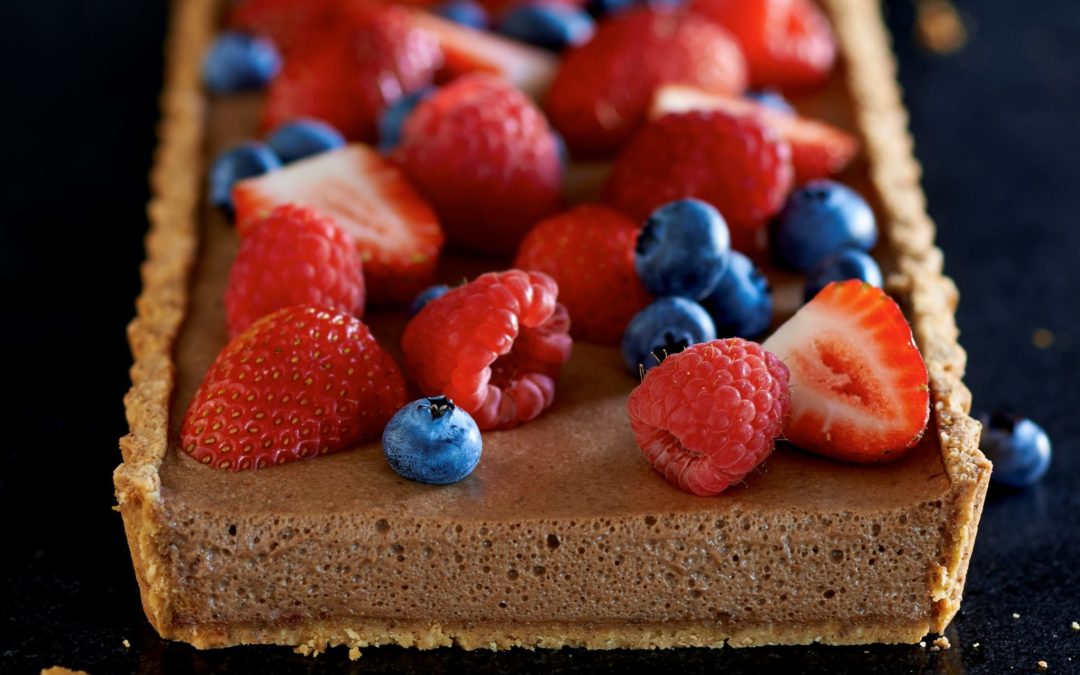
Aug 23, 2013 | The Fat Revolution
I feel the need to dispel one of the biggest myths about LCHF (low carb, high fat) diets after reading the latest article about the new book Don’t Quit Sugar.
This book is a direct attack on Sarah Wilson’s I Quit Sugar, and the author claims that she is simply saying “that natural sources of sugar—fruit, honey, sweet root vegetables —need to be incorporated into the diet.” Firstly, Sarah Wilson does not even advocate a diet without natural sugars. In fact, she eats raw honey and fruit and uses other natural sweeteners.
But, this nutritionist also said, “Sugar is our cells’ preferred source of energy and is absolutely critical to proper metabolic function. Eliminating it from the diet will do you harm.” This is the common myth I want to dispel.
Before I do, let me just say that I too consume small amounts of natural sugars. I love my fruit with large dollops of whipped cream. I use stevia regularly (although this doesn’t count as a sugar because it doesn’t act like a sugar in the body).
However, it is a huge myth that sugar, in any form, is essential. It is a myth that sugar is our cells preferred energy source. It is a also myth that we need to consume glucose for good brain function.
Firstly, our body’s preferred energy source is fat. We are natural fat burners. We only resort to sugar burning when we consume too much of it, and our body becomes acidic. Our body sees this as a health crisis, so it tries to burn the sugar to get rid of it. Unfortunately, these days, we keep dumping more and more in, so it never has a chance to get out of the sugar burning state.
Secondly, when we do consume a more natural diet, low in sugars and carbs and high in fats, fatty acids are converted into ketones, which cells also love using as an energy source, particularly the brain. In fact, the brain’s preferred energy source is a mixture of glucose and ketones. A brain running on glucose alone is running sub-optimally!
But yes, you read that right, I did say ‘glucose’ too. Even though I don’t advocate a no carbohydrate diet, those including no carbohydrates in their diet, like the Inuit back in the day, still supplied glucose to their brain. In this situation, the liver converts amino acids to glucose.
There is only one situation where we will NOT get glucose to our brain. And that is when we eat too much sugar! Eventually, once insulin resistance is bad enough, it is increases our risk of no longer being able to supply glucose to brain cells and they can start to die (Alzheimer’s). This is why Alzheimer’s is now often referred to as Type 3 diabetes.
But even in this situation, it has been shown in the literature that if the brain is offered another fuel source, cell function can start improving again. The other fuel source the brain can use is ketones! Ketones can be produced either with a ketogenic diet (low carb, high fat diet that is very strict in carbs) or with coconut oil (which stimulates the production of ketones), or even better, with both.
Sugar is in no way an essential part of our diet.
Note: The pic is a chocolate flan from The Fat Revolution Cookbook, which is a LCHF (low carb, high fat) cookbook, perfect for families and for those who don’t need to be super low in carbs. If you are looking for strict keto recipes (no root vegetables, fruit, nuts etc), use the Easy Keto Cookbook.

Dec 14, 2012 | The Fat Revolution
The results of the global education test have politicians blaming each other, and others are suggesting that busy parents are at fault. While experts are scratching their heads over our low academic performance, they may have missed the most obvious explanation.
I have been expecting to see a downward trend in academic performance for a while, and I think it will only get worse, a lot worse, unless we are prepared to make a huge change. Sure, if our children read more books, and watched less TV, then maybe they would be better readers. But is it possible that they don’t want to read, because it is too hard. Is it possible that just like overweight people don’t feel like exercising, children struggling with cognitive skills don’t feel like reading?
And why would they be struggling cognitively?
I hate to be blunt, but excess sugar can makes us dumb!. And, Australians ingest tons of the stuff. In the early 1800s, we consumed less than 4 tsp of sugar per day (including natural sugar). We now ingest between 30 and 50 tsp a day!
A new Australian study released in September shows that people in the higher range of normal blood glucose levels are suffering from brain atrophy.
Researchers have known for years that those with diabetes suffer from diminished brain function, but they were surprised that those in the high end of the ‘normal’ range suffer from a loss of memory and cognitive skills.
Dr Cherbuin said that the “findings may lead us to re-evaluate the concept of normal blood sugar levels and the definition of diabetes”.
Here is the abstract of the study. This is a subject that I discuss in both my books. A special school in the U.S. discovered that when children consumed sugary foods, their IQ dropped significantly.
As Patricia Hardman, Ph.D, says, “We had one child who was tested for his I.Q. and scored 140. Three days later he was tested and scored 100! It turned out that grandma had come for a visit and, that morning, had made the child pancakes for breakfast. Of course, they were smothered in sugary syrup. We waited another three days without sugar and tested him again. Sure enough, he scored 140. There’s no doubt about it. Sugar makes children poor learners.”
This school eliminates sugar from the diet of all children who attend.
My daughter has also experienced this first-hand. Every year she has taken the Naplan test, she achieved well above average in almost every area; with one exception. One year, she received a very average result. We were both looking at the results and pondering the big change. Then Anna had a light bulb moment. She realised that she and her friend both ate lollies the day of the test. For a child who doesn’t regularly consume sugar, the difference was quite remarkable.
When Anna was 11 she said, “I don’t eat sugar because it really affects my body, and I really want to have a good education. But, sugar ruins that. I used to eat lots of sugar at school every day, but I didn’t get it from home, I got it from my friends at school. Normally in Naplan, I have an above average outcome, but one day when we were doing Naplan, my friend bought a big packet of jelly beans to school. We ate quite a few before our Naplan test, and during, and my results turned out average. Now I kind of find sugar disgusting. Now that I know what it does to my body, it doesn’t make me want to eat it anymore.”
Imagine the huge academic disadvantage for those children consuming sugar daily. Most parents have been led to believe, through clever marketing and endorsement (from respected health organisations) that excess sugar intake is harmless. I don’t believe it is. And our children could be paying the price. I believe one of the best things I did for my children was dramatically reduce their sugar intake.

Nov 13, 2012 | The Fat Revolution
Many people accept acne as an inevitable part of growing up. Acne is blamed on everything from “evolutionary biology” to genetics, hormones, chocolate, or too much sun. The most common explanation is hormones. Experts often say that during periods in our lives, hormones become unbalanced and ‘wreak havoc’; most notably during puberty.
While we do have times in our lives where our hormones change, I believe that the effect of those changing hormones can be greatly mitigated by a good diet. Studies have shown that “acne is a disease of Western civilisation”. Studies of current hunter-gatherers and other populations living traditional lifestyles (1200 subjects in total, including 300 aged between 15 and 25), showed zero cases of acne. However, in Western populations, 79 to 95% of teenagers are afflicted with acne. In addition, up to 54% of adults over the age of 24 also suffer with a degree of acne. And for up to 12% of women and 3% of men, it can continue well into middle age.
 I believe our Western diet is a huge contributing factor. Over-consumption of sugar and carbohydrates can increase insulin and an insulin-like growth factor (IGF-1), which increases testosterone and leads our pores to secrete more sebum; oil that traps acne-causing bacteria. A more natural, low carbohydrates diet can have a huge impact on skin. My son is has never had an issue with acne through his teenage years—except when he has a weekend away and eats what his friends eat, but makes a choice knowing he will have about a week of bad skin.
I believe our Western diet is a huge contributing factor. Over-consumption of sugar and carbohydrates can increase insulin and an insulin-like growth factor (IGF-1), which increases testosterone and leads our pores to secrete more sebum; oil that traps acne-causing bacteria. A more natural, low carbohydrates diet can have a huge impact on skin. My son is has never had an issue with acne through his teenage years—except when he has a weekend away and eats what his friends eat, but makes a choice knowing he will have about a week of bad skin.
Cordain L, Lindeberg S, Hurtado M, Hill K, Eaton SB, Brand-Miller J. Acne Vulgaris: A Disease of Western Civilization. Arch Dermatol. 2002;138(12):1584–1590.
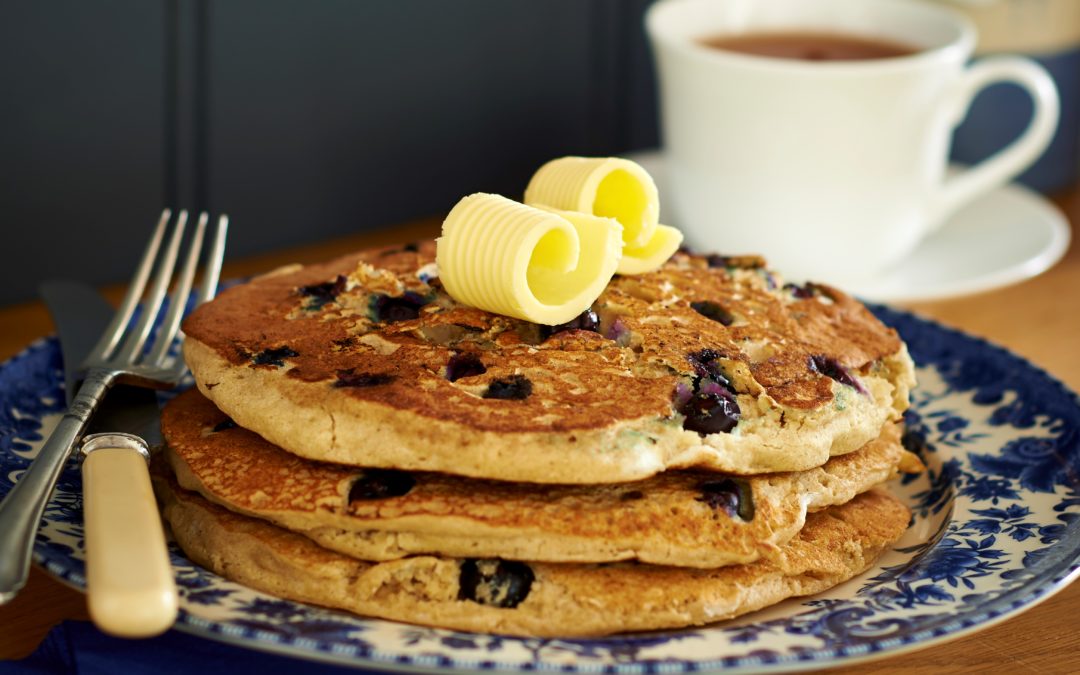
Aug 21, 2012 | The Fat Revolution
Anna’s buckwheat pancakes
½ cup buckwheat flour
⅛ cup coconut flour
1 tsp baking powder
4 scoops of stevia (scoops in the Nirvana pure stevia extract powder)
1 egg, separated
1 cup of milk
Pinch of salt
- Sift the flours and baking powder into a bowl. Add the salt and stevia and make a well in the middle. Pour the egg yolk and milk in and whisk well until just combined.
- Whisk the egg whites until peaks form and gently fold into the batter.
- Heat a cast iron or healthy non stick fry pan over medium heat and brush with oil. Drop tablespoons of batter onto the pan. Cook the pancakes until bubbles appear on the top side and then flip it over. Cook for another minute or so until golden.
Serving suggestions
Note: This recipe is from the Fat Revolution Cookbook, which is a LCHF (low carb, high fat) cookbook, perfect for families and for those who don’t need to be super low in carbs. If you would like to be strict keto (no root vegetables, fruit, nuts), use the Easy Keto Cookbook.
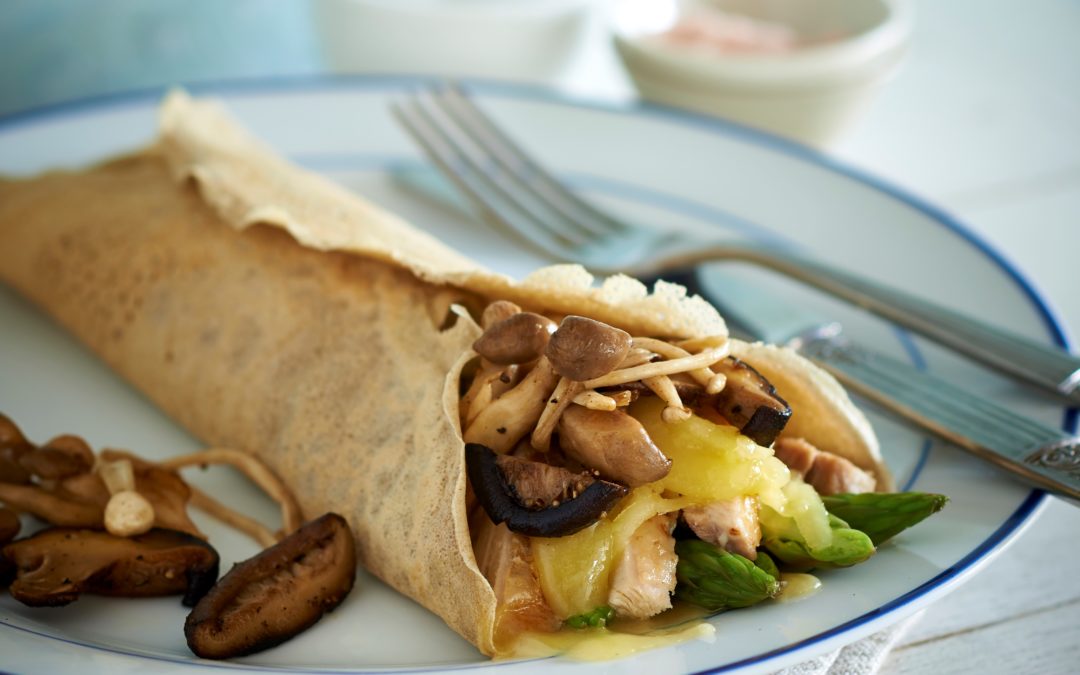
Aug 12, 2012 | The Fat Revolution
Buckwheat crepes are delicious, very versatile, and are extremely easy to make. And, they satisfy the bread craving if you have given up grains. Buckwheat is not a grain (it is actually related to the rhubarb), so it is a fantastic grain alternative.
Ingredients
4 eggs
1/2 cup buckwheat flour
1 cup filtered water
pinch salt
Coconut oil (for cooking)
- Preheat a cast iron skillet to medium heat (or a healthy non-stick fry pan).
- Beat the eggs with a whisk until egg yolk and white are well combined.
- Add the water and whisk.
- Add the dry ingredients and whisk until smooth.
- Using a pastry brush, oil the pan.
- Using a large serving spoon, pour the batter into the pan (approximately 1/4 cup for each crepe).
- Tilt the pan in a circular motion so the thin batter coats the surface evenly.
- Cook for approximately one minute, then loosen with a spatula, and flip to cook for another minute or so.
- Place cooked crepes into a tea towel, and if using later, store in an air tight container.
Tips
- Contrary to popular belief, crepes are very easy to make. If you end up with holes in the crepe, just fill them in with some extra batter.
- Use refined coconut oil so it doesn’t overheat (refined coconut oil has a much higher smoking point).
- Some buckwheat flour is stronger in taste than others (especially if it is not fresh). Shop around until you find a good one that is light in colour and very mild in flavour. We buy Coles brand of organic buckwheat flour.
Savoury (warm)
Ham and cheese
Ham, cheese and tomato
Chicken and cheese
Vegetables like fried mushrooms and asparagus with cheese
Wraps
Egg salad (boiled egg mixed with mayonnaise, salt and pepper)
Roast beef, chicken, or any kind of left over meat with salad
Butter with a dab of honey…yum!
Dessert
Strawberry and cream
Dutch apple (stewed apple with cinammon and a dash of stevia), served with ice cream or whipped cream
The possibilities are endless…
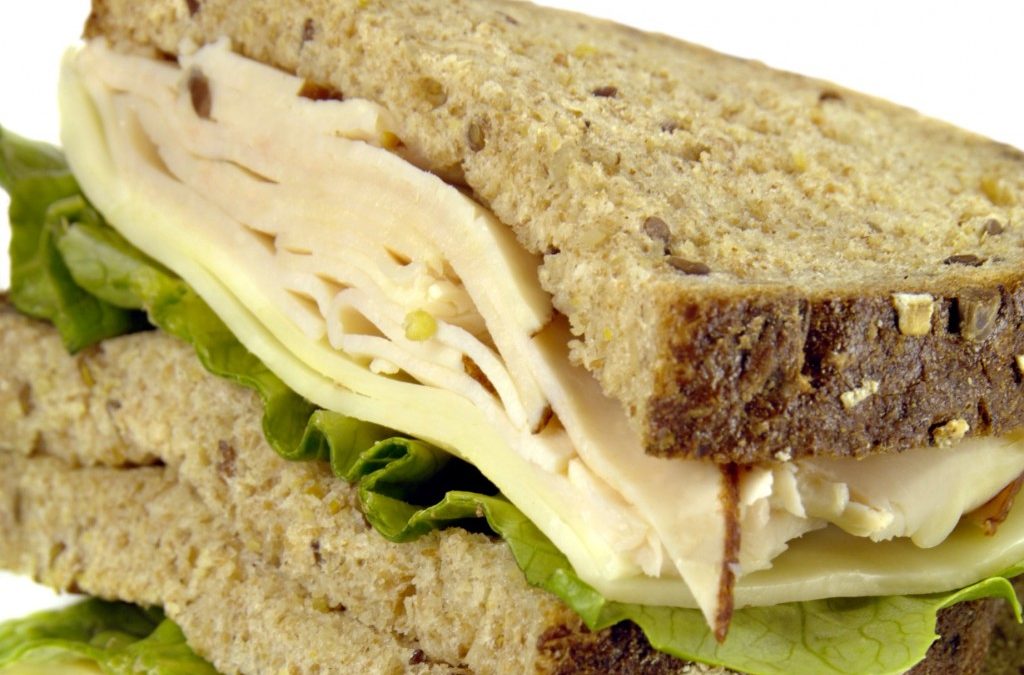
Jul 13, 2012 | The Fat Revolution
Whole grains are pushed on us like our lives depend on them. But are they a vehicle for weight loss? Or are they making us fat?
We have two beautiful Russian blue cats. One has a sleek figure, and the other is slightly pudgy. They are sisters, so why the different physique? The pudgy one misses her crunchy carbohydrate-filled cat food she got from the breeder, so she gets into the chicken food (grain). Not very appetising, surely, but addictions are funny that way.
The fear of fat is constantly drummed into us, but the real culprits continue to be excess sugar and grain; they both produce a strong insulin response and prompt our body to store fat. This is why livestock are fattened with low fat, whole grains (not fatty foods).
It is often claimed that whole grains do not cause a spike in our blood sugar the way that refined carbohydrates do. However, the fact is, there is very little difference in the blood sugar response of white bread and whole wheat bread. How? Our digestive enzymes convert the starch into glucose very easily, regardless of whether the flour is made with refined white flour or the wholesome variety, especially once the grain is milled into flour.
Many nutritionists use the glycemic index to preach the benefits of whole grains for weight loss. But even that argument doesn’t hold up. Have a look at glycemicindex.com and search for bread. Surprisingly, the whole grain bread is almost just as high on the glycemic index as white bread.
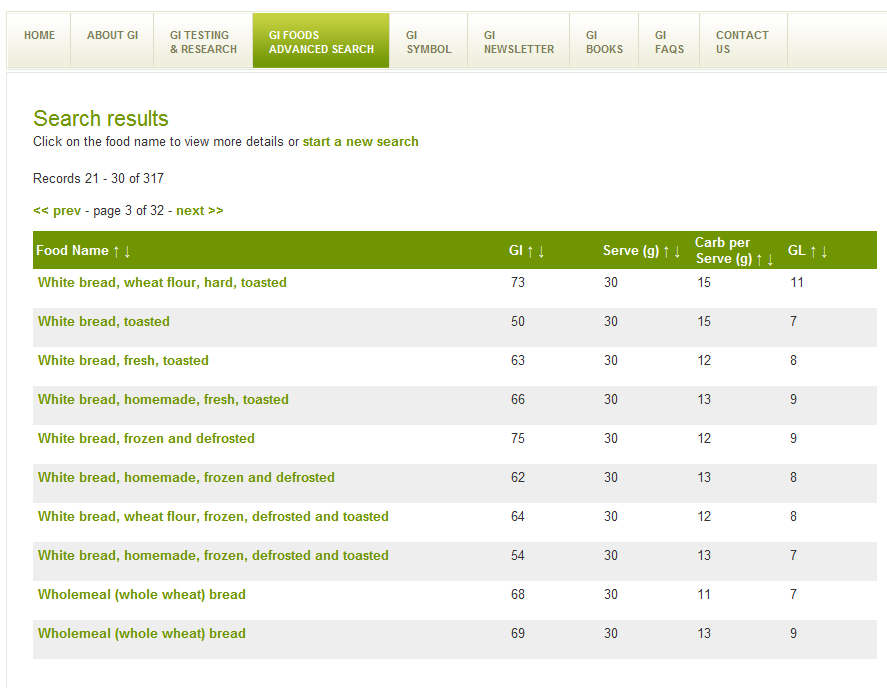
New Australian dietary guidelines encourage us to eat six servings of grain a day. Other ‘health’ recommendations recommend between six and 11 servings of grain per day. I know if I consumed the minimum six servings per day, I would be overweight; no question. In fact, I was overweight in my early 20s when my diet was based on ‘healthy’ whole grains.
If whole grains aren’t good for our waistline, what about our health?
‘Experts’ claim that whole grains help reduce risk of heart disease and cancer. But, many people are unaware that researchers don’t actually agree about the benefit of whole grains. In fact, some very strong evidence contradicts conventional claims, and suggests that eating these grains is detrimental to optimal health.
Researchers have presented studies claiming that whole grains prevent all sorts of illnesses, including diabetes, heart disease and obesity, but the subjects consuming whole grains have been compared to people eating white flour and other processed food. This is like saying that filtered cigarettes prevent cancer because in a study comparing filtered and unfiltered, the filtered cigarettes caused less cancer.
Our hunter-gatherer ancestors relied on meat, fruit, vegetables, and nuts. We now are dependent on cereal and grain, with some populations getting 80 per cent of their intake from a single type of grain.
Why are we so reliant on grains? Who does it benefit? With agriculture came the ability to cheaply feed billions of people with products that can easily be stored, shipped and processed; the most common are wheat, maize (corn), rice, sugar, soy, barley and oats. But there are several problems with heavy grain consumption.
When we eat a lot of grain, we don’t eat the food that nutritionally supports us like meat, eggs and fats. When we don’t eat enough protein from animal products, we are low in vitamin B12, which results in anaemia and cognitive dysfunction, and increases risk for arterial vascular disease and thrombosis. Too many grains also inhibit our absorption of vitamin D and our ability to absorb iron. Low levels of iron can impair children’s learning, and cause many other health issues. High grain diets can also interfere with the absorption of zinc and calcium, which dramatically impacts our health and bone strength.
Excess grain also inhibits our assimilation of protein, which can cause growth issues and deficiencies of essential nutrients, including zinc, iron, copper, calcium, vitamin D, vitamin B 12 and vitamin A. In addition, the protein in grains is inadequate for us to thrive.
Grains also act as allergens, which is why many people develop allergies to wheat and other grains. Excess grain causes severe autoimmune responses and obesity, and the excess fibre can cause gas, bloating, stomach cramps, rectal bleeding, constipation, and more. Most people are very pleasantly surprised when they discover bloating and gas are NOT a normal part of life once they reduce or eliminate grain.
Why are most grains so toxic to humans? The answer is to do with survival—of the plants! Grasses are eaten by herbivores; to protect themselves, grass seeds contain toxins that poison the digestive track of mammals. Why? So the seeds can pass through undigested and germinate.
As a result, when we ingest most grains, we end up with large amounts of undigested starch in our colon. Bad bacteria thrive on undigested food, particularly sugars and starches. In addition, gluten triggers an immune response that inflames the intestines in most people, not just those who have identified gluten intolerance. It is more serious in some because of further reactions to wheat, but gut damage occurs in the majority of those who consume it.
Cardiologist Dr William Davis, author of Wheat Belly, suggests that the reason wheat is the most toxic is that it has been hybridised several times, and in fact contains the toxins from three separate species. The original grain (einkorn wheat) started with 14 chromosomes. It was hybridised with goat grass, and then later with Triticum grass, resulting in modern wheat, which has 42 chromosomes.
So, if you have been stuffing down tasteless whole-grain kibbled bread thinking it would aid your health, you can replace it with more of the tasty real food like eggs, bacon, lamb chops, chips, fruit, whipped cream and other indulgences, and you and your digestive track may just breathe a huge sigh of relief.




 I believe our Western diet is a huge contributing factor. Over-consumption of sugar and carbohydrates can increase insulin and an insulin-like growth factor (IGF-1), which increases testosterone and leads our pores to secrete more sebum; oil that traps acne-causing bacteria. A more natural, low carbohydrates diet can have a huge impact on skin. My son is has never had an issue with acne through his teenage years—except when he has a weekend away and eats what his friends eat, but makes a choice knowing he will have about a week of bad skin.
I believe our Western diet is a huge contributing factor. Over-consumption of sugar and carbohydrates can increase insulin and an insulin-like growth factor (IGF-1), which increases testosterone and leads our pores to secrete more sebum; oil that traps acne-causing bacteria. A more natural, low carbohydrates diet can have a huge impact on skin. My son is has never had an issue with acne through his teenage years—except when he has a weekend away and eats what his friends eat, but makes a choice knowing he will have about a week of bad skin.


